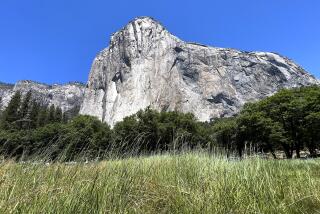Power to the Parks
- Share via
Most government agencies need look no further than the current year’s budget in managing their affairs. The National Park Service must look to the ages in safeguarding the nation’s natural, historic and cultural heritage. It makes sense, therefore, to give the Park Service a measure of independence that is not necessary or appropriate for most federal departments.
Congress should complete action before the end of this session on House-passed legislation sponsored by Rep. Bruce F. Vento (D-Minn.), chairman of the Interior parks subcommittee, that would take the Park Service largely out from under the control of the Interior Department.
The parks director would be appointed by the President to a five-year term, subject to Senate confirmation, and could be removed only for cause. At present the parks chief can be fired at any time by the President or, effectively, the secretary of the interior. Interior Department officials could not meddle in Park Service affairs or play political games with Park Service employees.
The bill is, no surprise, a reaction to the experiences of the past eight years, when the Park Service repeatedly was manipulated by secretaries of the interior and their political assistants. Political appointees were placed in key park oversight positions formerly held by professional managers. The present Administration does have a respected Park Service director in Californian William Penn Mott. But Mott has been forbidden by Interior officials to address a conference in Florida on Park Service business because of the political situation in Florida at the time. Time and again he was forced to change his considered positions on issues and legislation in appearances before Congress. Park Service professionals were demoted or forced to resign because they dared express opinions that did not fit the ideological mold of Interior Department supervisors.
But Vento’s measure makes sense regardless of the Administration. The Park Service has a unique responsibility of both protecting the resources of the parks for future generations of Americans and providing for their enjoyment and use by the current public. This is a delicate balance that should be determined by trained professional judgment, not by political whim. The Interior Department would maintain responsibility for the Park Service budget--not an inconsiderable influence. On the other hand, the Park Service director would have the authority to appeal directly to Congress in the event that Interior officials tried to skew the budget for political reasons.
Most of the public domain is open to so-called multiple use, for commercial exploitation of its resources balanced against some measure of conservation for future use. The parks and historic places are special, however. This national heritage is far too precious and delicate to be subjected to the ebb and flood of economic cycles and political shifts in the wind.
More to Read
Sign up for Essential California
The most important California stories and recommendations in your inbox every morning.
You may occasionally receive promotional content from the Los Angeles Times.













